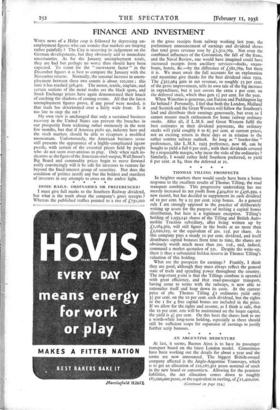HOME RAILS: ORDINARIES OR PREFERENCES?
I must give full marks to the Southern Railway dividend, but what is the truth about the company's gross receipts ? Whereas the published traffics pointed to a rise of £731,000 in the gross receipts from railway working last year, the preliminary announcement of earnings and dividend shows that total gross revenue rose by £1,312,769. Not even the combined influences of the Coronation, the fall of the franc, and the Naval Review, one would have imagined could have increased receipts from ancillary services- docks, steam- boats, hotels, &c.—by the difference of £581,769, but there it is. We must await the full accounts for an explanation and meantime give thanks for the best dividend since 1929. The £325,964 gain in net revenue, or roughly 25 per cent. of the gross improvement, tells its own tale of the big increase in expenditure, but it just covers the extra r per cent. on the deferred stock, which thus gets 11 per cent. for the year.
When Waterloo is generous, can Euston and Paddington lag far behind ? Personally, I feel that both the London, Midland and Scottish and the Great Western will follow the Southern's lead and distribute their earnings generously, but even so I cannot muster much enthusiasm for home railway ordinary stocks. After all, if L.M.S. and Great Western fulfil the best estimates in their dividend payments, the ordinary stocks will yield roughly 6 to 6/ per cent. at current prices, not an exciting return in these days or in relation to the rather sombre railway outlook. So long as " border-line " preferences, like L.M.S. 1923 preference, now 68, can be bought to yield a full 6 per cent., with their dividends covered by a respectable margin, why incur the risks of the ordinaries ? Similarly, I would rather hold Southern preferred, to yield 6 per cent. at 84, than the deferred at 21.
* * * *


















































 Previous page
Previous page